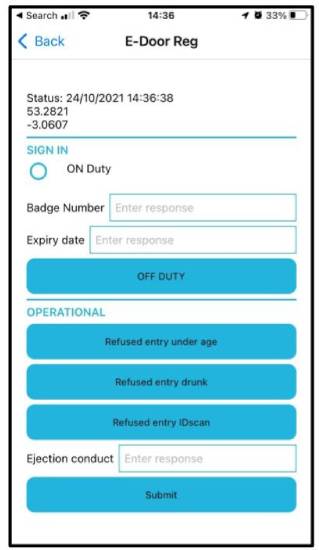News
[vc_row][vc_column]



The Need for Fire Door Audit Under Fire Safety Regulations 2005
Fire doors are an essential part of any fire safety system. They help to prevent the spread of fire and smoke, and they can help to save lives. However, fire doors can only be effective if they are properly installed and maintained.
The Fire Safety Regulations 2005 (FSR2005) require all fire doors to be inspected and tested on a regular basis. This is to ensure that they are still in good working order and that they will be able to perform their intended function in the event of a fire.
There are a number of things that can go wrong with fire doors, such as:
If any of these things happen, the fire door may not be able to perform its intended function in the event of a fire. This could lead to the spread of fire and smoke, and it could put people’s lives at risk.
That’s why it’s so important to have your fire doors audited on a regular basis. An audit will identify any problems with your fire doors and it will help to ensure that they are in good working order.
Yjis is not dissimilar to arranging for the full service of your fire extinguishers annually and can detect faults in advance of a failure that can cause that part of the fire defence to fail
If you’re not sure whether your fire doors have been audited recently, you should contact your local fire authority. They will be able to advise you on the best course of action or you can contact HSADD and we can help you with guidance, advice and audit reports.
Here are some of the benefits of having a fire door audit:
If you’re serious about fire safety, then you should have your fire doors audited on a regular basis. It’s an investment that could save lives.

Two of our Clients have had to deal with receiving letters, one was over three years ago, and the other was on 7th February 2023, for a slip claim that ‘allegedly’ occurred on 3rd February 2023.
A female entered the premises just 28 days after the alleged date and asked if the venue had CCTV from the date of the fall and that she needed to ‘report’ that she had fallen over – on a wet floor – 28 days earlier. She was fully aware that CCTV isn’t retained after a number of days, however, she miscalculated!
CCTV was immediately preserved for one night on either side of the alleged date, after a significant amount of searching we couldn’t see anyone falling over, let alone breaking an elbow and walking out! A report was completed and everything was stored. 10 days later the claim arrived!
The Client had ISITCHECKED and Compliance Management systems in use, so when the letter came in HSADD was tasked to reply and help with supporting evidence collation and within 24 hours the venue insurers were in possession of a significant file of training records, floor checks, Risk Assessments, staff details, Clean as you go Policy, induction records – plus CCTV which showed that no-one had fallen.
The Insurance and loss adjusters plus solicitors acting on behalf of the insurers were extremely pleased with not only the response time but the quality of evidence.



Similar to the above a female falls over, does not report anything to the venue, leaves the venue, and within 4 days a letter of claim arrives, with the wrong date on it! This produced a dilemma if we had relied on what they said we could see no incident, the venue didn’t and expanded the search to find an incident the day before.
Again a rapid response for the defence evidence enabled a quick response to the claim, which HD CCTV showed that the incident as described by the claimant was somewhat dissimilar from CCTV!
A video conference was arranged with the Loss Adjuster and once the evidence was explained to him and he watched the CCTV he is satisfied that this case will be stopped.
During the meeting the Loss adjuster commented “I AM VERY IMPRESSED WITH ISITCHECKED, IF THIS SYSTEM WAS DEPLOYED AND USED PROPERLY THIS WOULD CHANGE THE UK SLIP AND TRIP DEFENCE OVERNIGHT”

The Regulatory Reform (Fire Safety) Order 2005 (FSO) is the main piece of legislation governing fire safety in buildings in England and Wales. It places legal duties on anyone in control of these premises (the Responsible Person – usually the owner or landlord) to undertake a fire risk assessment and put in place and maintain general fire precautions.
The FSO applies to all workplaces and the common parts of buildings containing two or more domestic premises. This includes:
The Responsible Person must carry out a fire risk assessment to identify the fire hazards in their premises and to put in place measures to reduce the risk of fire and to ensure that people can safely escape in the event of a fire.

The fire risk assessment must be carried out by a competent person. This means someone who has the knowledge and experience to identify and assess fire hazards. The Responsible Person can carry out the assessment themselves, or they can appoint a competent person to do it for them.
The fire risk assessment should be recorded and kept up to date. It should be reviewed regularly to make sure that it is still accurate and that the measures in place are still effective.
The Responsible Person must also provide fire safety training to employees and other people who work on or in their premises. This training should cover the following:
The Responsible Person must also make sure that fire safety equipment is in good working order and that it is regularly checked and maintained.
The FSO is enforced by the fire and rescue authorities in England and Wales. If the fire and rescue authority finds that the Responsible Person has not complied with the FSO, they can take enforcement action. This could include issuing an improvement notice, a prohibition notice, or a fine.
The FSO is an important piece of legislation that helps to keep people safe from fire. By carrying out a fire risk assessment and putting in place fire safety measures, the Responsible Person can help to prevent fires and to ensure that people can safely escape in the event of a fire.